|
|
|
U.S. AND WORLD NEWS FROM
THE NEW YORK TIMES |
Ethics investigation finds
Palin abused power
|
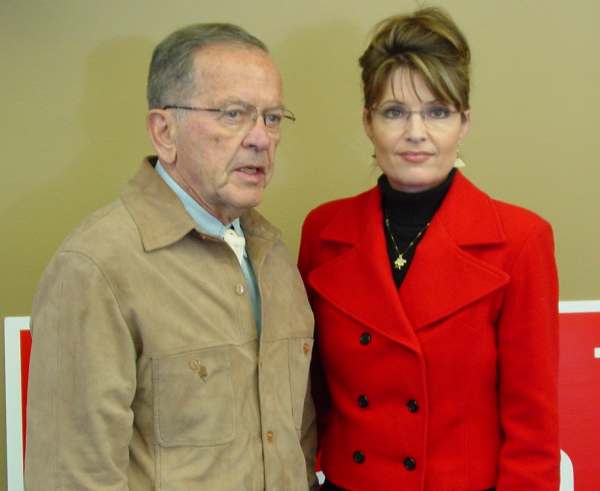 |
|
Legislative
committee releases investigation
into firing of public official |
ANCHORAGE, Alaska - Sarah Palin unlawfully
abused her power as governor by trying to have her
former brother-in-law fired as a state trooper, the
chief investigator of an Alaska legislative panel
concluded Friday. The politically charged inquiry
imperiled her reputation as a reformer on John
McCain's Republican ticket.
Investigator Stephen Branchflower, in a report by a
bipartisan panel that investigated the matter, found
Palin in violation of a state ethics law that
prohibits public officials from using their office
for personal gain.
The inquiry looked into her dismissal of Public
Safety Commissioner Walter Monegan, who said he lost
his job because he resisted pressure to fire a state
trooper involved in a bitter divorce with the
governor's sister. Palin says Monegan was fired as
part of a legitimate budget dispute.
The panel found that Palin let the family grudge
influence her decision-making even if it was not the
sole reason Monegan was dismissed. "I feel
vindicated," Monegan said. "It sounds like they've
validated my belief and opinions. And that tells me
I'm not totally out in left field."
Branchflower said Palin violated a statute of the
Alaska Executive Branch Ethics Act.
Palin and McCain's supporters had hoped the
inquiry's finding would be delayed until after the
presidential election to spare her any embarrassment
and to put aside an enduring distraction as she
campaigns as McCain's running mate in an uphill
contest against Democrat Barack Obama.
But the panel of lawmakers voted to release the
report, although not without dissension.
"I think there are some problems in this report,"
said Republican state Sen. Gary Stevens, a member of
the panel. "I would encourage people to be very
cautious, to look at this with a jaundiced eye."
The nearly 300-page report does not recommend
sanctions or a criminal investigation.
|
| |
|
Paulson 'Actively' Eyes Bank Investment |
 |
Republicans Rely
on More "F.D.R." social solutions |
At a White House briefing on Thursday,
Perino confirmed reports that the United States could soon
join the United Kingdom, Iceland and Italy in announcing a
plan to inject capital directly into their troubled banking
systems.
"These capital injections are something that Secretary
Paulson is actively considering," said Perino. She said she
couldn't comment on the timing or extent of such
investments.
The move would be made under the $700 billion Wall Street
bailout law enacted on Friday.
The focus of the bailout was a plan to have Treasury buying
damaged mortgage-backed securities from banks and financial
firms. The aim is to help firms improve their balance sheets
and profit prospects and attract capital from the private
sector. But the administration is now arguing that direct
investment is part of the powers under the act.
Treasury Secretary Henry Paulson first hinted of such a move
Wednesday in a speech about the bailout. He said increasing
capital investment in the nation's banking system is one of
Treasury's goals, and he seemed to suggest that such capital
could come directly from taxpayers.
The new law gives "broad flexible authorities for Treasury
to buy or insure troubled assets, provide guarantees, and
inject capital," Paulson said.
Paulson vowed to "use all of the tools we've been given ...
including strengthening the capitalization of financial
institutions of every size."
The reports cheered some experts who had argued that such
direct investment was the best way to help financial
companies.
"The proper way to resolve a banking crisis is not to buy
toxic assets but rather to recapitalize banks directly via
injections of public capital (in the form of preferred
shares) into distressed but solvent financial institutions,"
wrote Nouriel Roubini, professor of economics at New York
University's Stern School of Business, on his blog Thursday.
Treasury had been reluctant to move in that direction during
debate over the bailout bill and it is significant that
officials are now talking about the possibility of such
direct investment, Roubini wrote.
"The 180 degree turn in the Treasury position is driven by
the disastrous market reaction to the passage of this
legislation and to the realization that U.S. banks are in
such a deep trouble that, absent a direct partial public
takeover of the banks, this severe financial crisis will get
much worse," wrote Roubini.
Jaret Seiberg, a financial services analyst at the Stanford
Group, said in a note that he believes buying shares would
be a good move for banks and their shareholders.
He said even if government stock purchases dilute the value
of shares held by investors, they are unlikely to wipe out
current holdings. |
| |
|
"TROOPERGATE"
|
|
Began prior to Palin's
Selection as McCain Mate |
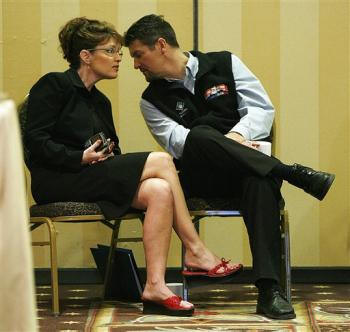 |
Husband Wanted
`Dangerous'
Alaskan Trooper
to Be Fired |
Thursday, Oct 9, 2008
Alaska Governor Sarah Palin's husband spoke numerous times to
state officials about firing his ex- brother-in-law, a state
trooper he described as ``dangerous'' to the governor's family,
according to a sworn statement.
Todd Palin, who had refused to answer questions, agreed on Oct.
6 to cooperate with an inquiry into the governor's firing of
Walt Monegan, the state Public Safety Commissioner, on July 11.
Monegan alleges Sarah Palin took the action after he resisted
pressure to fire trooper Mike Wooten, who was involved in a
divorce and custody battle with the governor's sister.
``I had hundreds of conversations and communications about
Trooper Wooten over the last several years with my family, with
friends, with colleagues and with just about everyone I could,
including government officials,'' Todd Palin said in a 25-page
statement to a state investigator that was released to media
late yesterday.
The probe took on national importance after Republican
presidential nominee John McCain picked Palin as his running
mate. A legislative report is due tomorrow on whether Governor
Palin abused her power by firing Monegan. The governor has said
she didn't pressure Monegan and dismissed him because of
budgetary disagreements.
The investigation, dubbed ``Troopergate,'' began before McCain
picked Sarah Palin as his running mate on Aug. 29.
The Alaska Legislative Council, a bipartisan committee of 14
lawmakers that conducts business when the full Legislature
isn't in session, voted unanimously on July 31 to start the
investigation.
Sarah Palin and the McCain campaign say the inquiry is
politically biased. She is cooperating with a separate
investigation conducted by the state Personnel Board and has
agreed to be questioned within two weeks as part of that
inquiry. No deadline has been announced in that investigation.
|
| |
|
They don't
call him President Bush
in Venezuela anymore. |
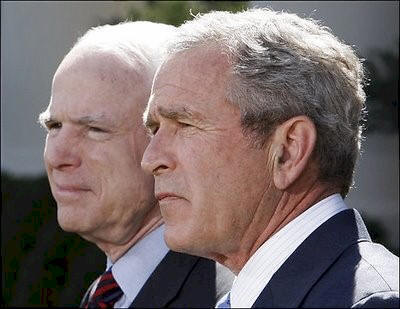 |
Now he's
known as
"Comrade." |
CARACAS, Venezuela —
With the Bush administration's Treasury
Department resorting to government bailout after
government bailout to keep the U.S. economy
afloat, leftist governments and their political
allies in Latin America are having a field day,
gloating one day and taunting Bush the next for
adopting the types of interventionist government
policies that he's long condemned.
"We were just talking about that this morning on
the floor," said Congressman Edwin Castro , who
heads the leftist Sandinista congressional bloc
in Nicaragua . "We think the Bush administration
should follow the same policies that they and
the International Monetary Fund have always told
us to follow when we have economic problems — a
structural adjustment that requires cutting
government spending and reducing the role of
government.
"One of our economists was telling us that Bush
has just implemented communism for the rich,"
Castro said.
No one in Latin America has been making more hay
of Bush's turnabout than Venezuela's President
Hugo Chavez , a self-proclaimed socialist who is
the U.S.'s biggest headache in the region.
"If the Venezuelan government, for example,
approves a law to protect consumers, they say,
'Take notice, Chavez is a tyrant!'" Chavez said
in one of his recent weekly television shows.
"Or they say, 'Chavez is regulating prices. He
is violating the laws of the marketplace.' How
many times have they criticized me for
nationalizing the phone company? They say, 'The
state shouldn't get involved in that.' But now
they don't criticize Bush for having nationalize
. . . the biggest banks in the world. Comrade
Bush, how are you?"
The audience laughed and Chavez continued.
"Comrade Bush is heading toward socialism."
That certainly isn't the view of the Bush
administration, which sees the government plan
to buy toxic mortgages and the takeover of a
major insurance company as well as two huge
mortgage lenders as distasteful but necessary
temporary measures to right the listing U.S.
economy and prevent a worldwide depression.
Mark Weisbrodt , director of the leftist
Washington -based Center for Economic and Policy
Research , advises numerous Latin American
governments.
He called the recent Bush administration
policies ironic.
"The biggest nationalization in the world was of
Fannie Mae and Freddie Mac . The biggest
nationalization of an insurer was AIG. People
are saying that Bush is privatizing risk and
socializing losses," Weisbrodt said.
John Ross , who has begun providing advice to
the Chavez government, along with his boss,
former London Mayor "Red" Ken Livingstone ,
criticized the U.S. president and his
conservative political allies.
"They have abandoned every policy that they've
advocated that other governments should follow
over the past 20 years," Ross said by telephone
from London . "And they've adopted the measures
that they've condemned other governments for
taking.
"This is not the end of capitalism. But it is
the end of Reaganism and Thatcherism," he added.
British Prime Minister Margaret Thatcher , a
conservative, was a close ally of President
Reagan in the 1980s.
In Peru , Congresswoman Nancy Obregon said she
thought Bush's actions were sounding the death
knell for capitalism.
"He's driving it into the ground," said Obregon,
a socialist. "He's imitating Evo Morales ."
Morales is the socialist president of Bolivia
who has nationalized a half dozen foreign
companies.
But Bolivia's ambassador in Venezuela , Jorge
Alvarado , took issue with Obregon's comparison.
"Bush is guilty of a double-standard, but it
would be an exaggeration to say he's imitating
Evo," said Alvarado. "He'd have to be re-born to
imitate Evo!"
Manuel Sutherland , a senior official in the
Caracas -based Latin American Association of
Marxist Economists , said that Bush has become a
fellow traveler.
But Sutherland said he wasn't about to let Bush
join his group.
"He carries out nationalizations to save
capitalism," Sutherland said. "We want to sink
it."
|
| |
| |
 |
"Not for Use in Kids Under Four'"
|
New cough syrup labels to say 'not for use
in kids under four'
Manufacturers of non-prescription pediatric cough and cold
medicines are advising parents not to give them to children
under age four, a consumer group announced.
"Leading manufacturers of these medicines are voluntarily
transitioning the labeling on oral over the counter
pediatric cough and cold medicines to state 'do not use in
children under four years of age'," said a statement issued
Tuesday by the Consumer Healthcare Products Association.
The announcement comes a week after federal authorities said
they had little data on the benefits of such medicines for
very young children.
But the US Food and Drug Administration decided not to pull
them from the market, fearing parents might begin
administering adult cough and cold medicine to their
offspring if they did so.
Labels on the pediatric medicines will continue to carry
dosing instructions for children four and above, the group
said.
Products with existing labeling will not be removed from
store shelves but will gradually be replaced with products
containing the new labels and packaging during the 2008-2009
cold season, it said.
Manufacturers are also adding language to labels of products
containing antihistamines, warning parents not to give them
to children to make them sleepy, the statement said.
In January 2008, after the FDA warned of the serious risk
such medicines pose for children younger than two,
pharmaceutical firms stopped marketing them for that age
group.
American pediatricians welcomed the move, although they
would like to see it extended for children up to the age of
five.
The FDA is currently studying the effectiveness of over the
counter cough and cold medicines for children under the age
of 12, but a decision could be a year away.
|
| |
|
French and German scientists
Win Noble Prize for Medicine |
|
 |
French and German scientists credited with the discovery
of the viruses behind AIDS and cervical cancer won Monday
the Nobel Medicine Prize, the first of the prestigious
awards to be announced this year.
France's Francoise Barre-Sinoussi and Luc Montagnier, who
shared one half of the award, discovered the human
immunodeficiency virus (HIV) that causes AIDS, one of the
biggest scourges of modern times.
Harald zur Hausen of Germany won the other half of the award
for going against the then-current dogma and claiming that a
virus, the human papilloma virus (HPV), causes cervical
cancer, the second most common cancer among women.
The French pair's HIV discovery was "one prerequisite for
the current understanding of the biology of the disease and
its antiretroviral treatment," the Nobel citation said.
Their work "led to development of methods to diagnose
infected patients and to screen blood products, which has
limited the spread of the pandemic," it said.
Montagnier dedicated his award to AIDS sufferers and
predicted results on a "therapeutic vaccine" for the
pandemic within four years.
"I think my first reaction is to think of all the people
sick with AIDS and all those who are still alive and
fighting against the illness," Montagnier told AFP.
He said a treatment could be possible in the future with a
"therapeutic" rather than preventive vaccine for which
results could be published in three or four years if the
researcher can secure financial backing.
AIDS -- acquired immune deficiency syndrome -- first came to
public notice in 1981, when US doctors noted an unusual
cluster of deaths among young homosexuals in California and
New York.
It has since killed at least 25 million people, and 33
million others are living with the disease or harbouring
HIV.
In May 1983, in a paper published in the US journal Science,
a team from France's Pasteur Institute, led by Montagnier
and including Barre-Sinoussi, described a suspect virus
found in a patient who had died of AIDS.
Their groundbreaking discovery was also helped by US
researcher Robert Gallo's determination that the virus was
indeed the cause of AIDS.
Both Montagnier and Gallo are co-credited with discovering
that HIV causes AIDS, although for several years they staked
rival claims that led to a legal and even diplomatic dispute
between France and the United States.
The Nobel jury made no mention of Gallo in its citation.
"We gave the prize for the discovery of the virus. The two
to whom we gave the prize, Francoise Barre-Sinoussi and Luc
Montagnier, discovered the virus," Hans Joernvall of the
Nobel committee told AFP.
Acknowledging that the American had "done a lot of other
work" in the field, Joernvall noted that Gallo and the two
French scientists now "agree that the discovery was made in
Paris."
Another member of the jury, Bjoern Vennstroem, said he hoped
the award would silence those who claim that HIV does not
cause AIDS.
"We hope this will put an end to conspiracy theories and
others who defend ideas that are not founded in research,"
he told Swedish Radio.
Montagnier, 76, is a professor emeritus and director of the
World Foundation for AIDS Research and Prevention in Paris,
while Barre-Sinoussi, 61, is a professor at the Institut
Pasteur, also in the French capital.
"I must admit that I never for a moment dreamt I would hear
such news," Barre-Sinoussi told French radio by telephone
from Cambodia.
Meanwhile, Zur Hausen was rewarded for his work on what is
sometimes called "the silent killer" of women because it is
often undetected until it is too late.
"His discovery has led to characterisation of the natural
history of human papilloma virus (HPV) infection, and
understanding of mechanisms of HPV-induced carcinogenesis
and the development of prophylactic vaccines against HPV
acquisition," the jury said.
It pointed out that five percent of cancers worldwide were
caused by the virus. Fifty to 80 percent of the population
is infected with the virus, though not all infections are
cancerous.
"This prize means a great deal to me because on the one hand
an area has been recognised that has increasingly moved to
the forefront in cancer research, namely the role of
infectious agents," Zur Hausen, 72, said in an interview
with German television.
Today, a simple smear test can detect HPV and there are two
effective vaccines against it.
Zur Hausen is a professor emeritus and former chairman and
scientific director of the German Cancer Research Centre in
Heidelberg.
The laureates will receive a gold medal, a diploma and 10
million Swedish kronor (1.42 million dollars, 1.02 million
euros) -- half for Zur Hausen and half for the French pair
-- at a formal ceremony in Stockholm on December 10.
The Nobel Medicine Prize website
|
| |
|
Iraq
|
|
The Only Place Unaffected by Financial Turmoil |
|
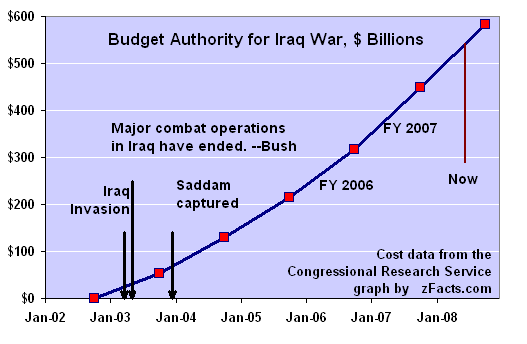
|
WASHINGTON — Fear and uncertainty were hot commodities in
global markets Monday.
Stocks plummeted and currencies fell as shock waves from the
Wall Street meltdown continued to reverberate across
financial capitals.
The Mexican peso plunged to its lowest level in years. Its
stock market dropped 5.4 percent.
Brazil and Russia temporarily halted trading after a series
of steep drops on their exchanges.
Meanwhile, Sweden , Denmark and Austria joined Ireland and
Germany on a growing list of European countries that have
pledged to guarantee bank deposits to tamp down consumer
worries.
"This is a stampede," said Valerie Plagnol , chief
strategist at CM-CIC Securities in Paris .
On the very day that Washington began to unfold the $700
billion economic rescue mission, foreign governments and
investors seemed resigned to a long period of tight credit
and turmoil.
Russia suspended its benchmark RTS stock index twice on
Monday, as it fell 19.1 percent, its worst ever one-day
drop. It had already halted trading three times last Friday,
hoping to slow sliding shares and capping the market's worst
week in nearly a decade.
Russia on Monday also shut down its second major market, the
Micex, three times. It had fallen nearly 19 percent.
The global credit crunch has compounded Russia's financial
woes. It's already reeling from the one-two punch of falling
oil prices and the loss of billions in foreign investment
after the August war with Georgia .
In Latin America , the U.S. financial crisis caused trading
on Brazil's stock exchange to be halted twice on a day when
the value dropped by 8 percent.
In Argentina , stocks fell 10 percent, and currencies across
the region tumbled against the dollar.
"The turmoil is really starting to hit Latin America ," Jane
Eddy , a senior regional specialist for ratings agency
Standard & Poor's . "You have stock market drops, currencies
weakening and credit really drying up. Everyone is on hold
waiting to see what will happen over the next two weeks."
The uncertainty comes at a time when Latin America has been
enjoying its strongest sustained economic growth in 25
years. The region grew by 5.7 percent in 2007 and was
projected to grow by about 4.5 percent in 2008.
Thomaz Teixeira , a stock analyst at Socopa Corretora in Sao
Paulo , said investors were not necessarily in a "panic."
"But they're selling for the sake of selling at whatever
price," he said. "In time, though, we believe that the
market will heal."
In South Africa , the stock market hit its lowest mark in
more than eight years. Banks in Zimbabwe ran out of cash
after depositors tried to pull out their money.
In Pakistan , already embattled on the political front, the
rupee hit a new low against the dollar. With its currency
having lost 21 percent of its value already this year,
Standard & Poor's warned that the country was close to
bankruptcy.
Next door, in India , stocks fell nearly 5.8 percent, the
lowest close in two years. The index has shed more than 42
percent of its value this year, with foreign investors
leading the retreat.
In response, the capital market regulator lifted curbs
Monday on overseas investors to halt record sales by
offshore funds.
In the Middle East , Kuwait pumped $374.3 million into the
banking systems Monday and Saudi Arabia injected more $26
million into its stock market, local newspapers reported.
Apparently immune to all the turbulence was Iraq . The
government has little if any investments in the institutions
affected by the crisis and a barely functioning stock
market. Most Iraqis keep their money in their homes rather
than trust banks.
"We don't believe it will affect our bank balance," said
Minister of Industry Fawzi Hariri . "In the short term we'll
be one of the least affected nations."
The Iraqi government has more than $25 billion in cash
reserves. Even with oil prices dropping below $90 a barrel,
the Iraqis forecast oil revenues to be in the neighborhood
of $80 billion .
|
| |
|
|
Suicide watch
|
|
|
War veterans at risk need care and follow-up
July 29, 2008
In its first year of operation, a suicide hot line has
prevented 1,221 veterans from taking their lives. That's
the sobering word from the Veterans Affairs Department,
which launched the help line last July. We say sobering
because no one can say how many others might have been
saved had the government that sent men and women into
war in Iraq and Afghanistan been adequately prepared to
serve the numbers of returning soldiers at risk of
suicide because of post-traumatic stress disorder.
Just as the Bush administration lacked a postwar plan
for Iraq, it lacked the resources and staff to treat the
physical and mental health concerns of service members
returning from combat. The most disgraceful example was
the poor treatment of many war veterans recuperating at
Walter Reed Army Medical Center, conditions that led to
firings and congressional hearings.
The suicide prevention hot line was started by the VA
and the Substance Abuse and Mental Health Services
Administration after families of at-risk soldiers,
veterans groups and others complained. The hot line has
since served 22,000 veterans. How many are Iraq and
Afghanistan war veterans isn't readily available because
hot line counselors don't routinely ask.
But the need is there. In 2006, the Army reported the
highest suicide rate since it began recording the deaths
in 1980 - 17.3 per 100,000 soldiers. Of the 99 soldiers
who killed themselves that year, nearly a third took
their lives while in Iraq or Afghanistan, the Army
reported.
A VA study found that 53 percent of veterans returning
from Iraq and Afghanistan who committed suicide between
2001 and 2005 were reservists or National Guardsmen,
citizen soldiers who may be less able to navigate the
bureaucracy to get help.
A Rand Corp. study released in April found that 300,000
Iraq and Afghanistan war veterans suffered from PTSD or
depression, which puts them at greater risk for other
psychological problems or suicide attempts.
A suicide prevention hot line may be the first attempt
by a veteran to seek help. In 90 percent of the calls, a
veteran was contacted and referred for help. That's as
it must be. After surviving the battlefield, American
service members can't be forgotten at home.
|
|
VA Gets 55,000 Plus
Suicide Calls
|
July 28, 2008(CBS) CBS News investigative producer Pia
Malbran wrote this story for CBSNews.com.
More than 55,000 people - including about 22,000 who
identified themselves as veterans - have called the
Department of Veterans Affairs’ suicide hotline during
its first year in operation and CBS News has learned
that many of the calls, in recent months, have come from
the mid to south central part of the country.
According to the VA’s own count, during a three month
time period between March and May of this year, the
regions where the highest number of calls originated
include the states of Texas, Tennessee, Illinois and
Florida among other surrounding areas. (California and
Florida have the nation's largest veteran populations.)
Other data, obtained by CBS News, shows that during the
first six months of the hotline’s operation, the state
of Texas had more callers than any other state with
2,102 out of 21,439 calls. California came in second
with 2,088 calls, then Florida (1,250 calls) and
Massachusetts (1,051 calls.)
Calls to the VA’s hotline more than doubled this
calendar year going from a total of about 21,000 in
January to more than 55,000 by the end of June,
averaging about 250 calls a day.
Out of 55,469 calls that the VA’s suicide hotline has
received in the last year, 22,044 callers identify
themselves as veterans. Callers can remain anonymous if
they choose. About 3,000 (2,966) identified themselves
as a family member or friend of a vet. Six hundred (621)
said they were on active-duty. The VA rescued 1,221
callers with emergency responders while 2,911 received
help in what the VA calls a “warm transfer.” More than
4,500 (4,592) callers were referred to a VA suicide
prevention coordinator in their local area. The VA says
they don’t know of any individuals who committed suicide
after using the 1-800-number. A spokesperson for the VA
told CBS News that “there are none that we are aware of
that have occurred when they called the hotline.”
Janet Kemp, the VA coordinator in charge of the hotline,
told The Associated Press (AP) that the hotline is
geared prevent deaths and help vets who may not get the
help they need in time. “They have indicated to us that
they are in extreme danger, either they have guns in
their hand or they're standing on a bridge, or they've
already swallowed pills,” Kemp said, according to the
AP.
The VA launched its suicide prevention hotline last
July. It teamed up with the government’s mental health
agency, the Substance Abuse and Mental Health Services
Administration (SAMHA), which had a pre-exiting 24-hour,
toll-free number that had been around since 2005. The VA
created an option on that national hotline dedicated
specifically for those who have served in the military.
When veterans, their family members or friends call
1-800-273-TALK (8255), a voice recorder instructs them
to press "1" to reach the VA hotline. The calls are then
routed to a call center in Canandaigua, New York where
mental health professionals, who work with the VA,
answer phones.
A recent RAND Corporation study found that nearly 20
percent, or about 300,000 veterans out of the
approximately 1.64 million who served in Iraq and
Afghanistan, currently suffer from major depression or
post traumatic stress disorder. A news report last
November by CBS News Chief Investigative Correspondent
Armen Keteyian discovered that in 2005 more than 6,200
veterans had committed suicide at a rate twice that of
non-veterans. A series of internal VA emails, which were
exposed earlier this year, confirmed CBS’ findings as
well as revealed that about 1,000 vets seeking care from
the VA attempt suicide every month for a total of about
12,000 a year.
The VA is making several efforts to improve the hotline.
The agency just started a three-month pilot project to
test several public service announcements in Washington,
D.C. advertising the 1-800-number. They created a
television PSA featuring actor Gary Sinise who famously
portrayed a disabled veteran in the 1994 movie Forrest
Gump. If the ads go well in the D.C. area, the VA will
then consider advertising in other states across the
country.
“The need for this is clear, and I hope this program
will be taken nationwide soon,” said Congressman Harry
Mitchell, a democrat from Arizona, who was instrumental
in pushing the VA to beef up its suicide outreach. “We
can't just wait for veterans to come to us, we need to
bring the VA to our veterans,” he added.
The VA also told The Associated Press that there is a
plan to hire 212 more people to answer phones and,
according to the AP, counselors can quickly match
callers with their medical records and then connect them
directly with local VA hospitals for follow-up and care.
|
|
McCain shakes up
staff amid
concern about 'unforced errors' |
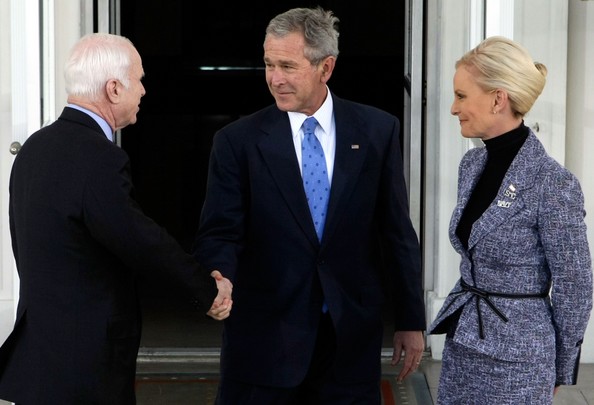 |
Insiders say severe campaign structural problems caused
series of missteps
Steve Schmidt to take over day-to-day operations in
McCain campaign
The Bush campaign veteran will report to campaign
manager Rick Davis
An aide says Schmidt's top priority will be to stop
campaign 'errors'
July 2,2008 - WASHINGTON -- Sen. John McCain's campaign
announced a shakeup at the top Wednesday, in the wake of
growing Republican concern about its ability to compete
against Sen. Barack Obama.
Campaign manager Rick Davis said Tuesday that senior
adviser Steve Schmidt would take over day-to-day
operations of the campaign.
The Bush campaign veteran will report to Davis, but the
rest of the campaign will report to Schmidt, who will be
in charge of everything from messaging and
communications to the political structure, organization
and scheduling.
Davis will shift into what's being described as a more
"natural role" for him -- the kind of duties he handled
before last summer's mass firings in the McCain
campaign. He will work on the vice presidential search
and on planning matters such as the Republican National
Convention.
Schmidt's top priority, according to a senior aide, will
be to stop "unforced errors in the campaign."
Schmidt had been a regular on the road with McCain until
recently, when he quietly returned to headquarters to
help fix what insiders admit are severe structural
problems that caused a series of missteps:
Hiring, then firing, lobbyists who worked for the
military junta in Myanmar, then creating a strict
anti-lobbyist policy that caused several lobbyists to be
dismissed from the campaign.
Poor vetting that led to endorsements by controversial
figures like ministers John Hagee and Rod Parsley, which
McCain didn't reject until after months of bad press.
The campaign also paid for a TV ad to distance McCain
from President Bush. The ad's script read, "John McCain
stood up to the president and sounded the alarm on
global warming ... five years ago." McCain later
reversed his position and stood with Bush on the
controversial idea of offshore oil drilling.
That, combined with an erratic schedule of speeches too
late to make newscasts, and inconsistent themes against
Obama, all have made for what senior McCain advisers
admit has been a muddled message.
Schmidt is also expected to shore up what some believe
is a misguided political operation put in place by Davis
-- a decentralized system of regional campaign managers
who are not given clear instructions from the central
campaign.
After Davis announced Schmidt's new role, 11 regional
directors were told via phone that they would report to
Schmidt. Changes to the campaign structure were not
discussed during the call, but CNN has been told that
the structure will almost certainly be altered.
Schmidt will be assisted by Mike McDonald, a fellow
veteran of the Bush-Cheney and Arnold Schwarzenegger
campaigns, who recently joined him on the McCain team.
Mike DuHaime, Rudy Giuliani's former campaign manager
and another longtime associate of Schmidt's, who has
been working for both the McCain team and the Republican
National Committee, will also be taking on more
responsibility.
McCain advisers privately tell CNN that the moves are a
direct result of missteps in messaging and scheduling
that didn't give the candidate a good platform, and a
political structure that many thought was misguided.
The Wednesday shakeup comes on the first anniversary of
what McCain aides call "Black Monday" -- when much of
the campaign's staff was fired because it ran out of
money and began collapsing.
|
|
|
|
U.S. criticizes
report Israel
likely to attack |
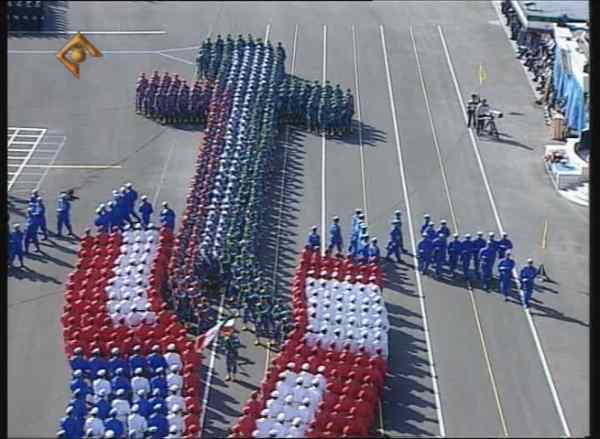 |
The U.S. State Department on Tuesday criticized reported
comments by a senior defense official who said there was
an increasing likelihood Israel would attack Iran over
its nuclear program.
The unidentified U.S. defense official told ABC News it
was increasingly likely Israel would attack Iran,
prompting retaliation against both Israel and the United
States.
"I have no information that would substantiate that, and
I think it's rather foolish of people who often have no
clue what they're talking about to assert things and not
even have the courtesy to do so on the basis of their
name," State Department spokesman Tom Casey said.
The defense official told ABC News one red line that
could trigger an Israeli offensive would be when Iran's
nuclear facility had produced enough enriched uranium to
create an atomic weapon. That could happen in 2009 or
later this year, ABC News reported, citing U.S. and
Israeli intelligence assessments.
Pentagon spokesman Bryan Whitman said "I don't comment
for Israel" when asked about the ABC News report.
"We are going to address the concerns that we have with
Iran diplomatically and with international organizations
that can bring some pressure to bear on this issue," he
said. "That is the focus of the U.S. effort."
Asked if he had noticed increasing concern within the
Pentagon in recent weeks about the possibility of an
Israeli strike, Whitman told reporters: "You guys have
all worked here long enough, you can find somebody with
just about any opinion you want in this building."
In Tel Aviv, a Western diplomat said there was unlikely
to be any Israeli or U.S. attack on Iran in the next six
months "because the military option is the last thing
that we need to do and it will not be used easily."
He also said he expected France, which took over the
presidency of the European Union on Tuesday, to be
tougher on Tehran because President Nicolas Sarkozy has
a strong position against Iran.
The diplomat said there was no consensus in Israel in
favor of an attack and that the United States was
unlikely to take action because it estimated Iran's
nuclear program would not reach a point of no return for
about two years.
"I don't think there will be an attack in the next six
months," the diplomat said.
|
|
|
|
|
Return to top of page
|
|

![]()








